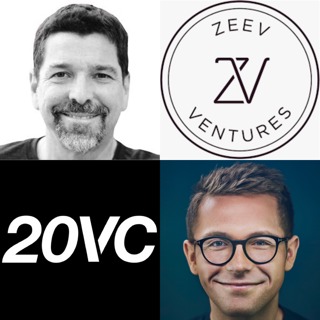
20VC: Oren Zeev on Raising 3 Funds and $1BN in 12 Months; Why Temporal Diversification is BS, Why Both LPs and GPs are Way Over-Diversified & Why Venture Partnerships are Sub-Optimal and Challenging
Oren Zeev is the Founding Partner @ Zeev Ventures and one of the OGs of solo capitalism. Oren has an incredible portfolio including investments in Audible, Houzz, Chegg, Riverside, Tipalti, TripActions, and Firebolt to name a few. Oren is also very unlike any other VC firm, he does not employ any associates, principals, or staff. He doesn't have partners or partner meetings. No LP meetings. No processes. No investment committees or memos. Nada. Oren is doing it differently. Prior to starting Zeev Ventures, Oren spent 12 years as a GP @ Apax Partners where he c-headed their technology practice in their Silicon Valley office. In Today's Episode with Oren Zeev You Will Learn: 1.) Origins into Venture: How did Oren make his way into venture over 20 years ago? How does the crash of today compare to the dot com and 2008? What is the same? What is different? Why did Oren decide to leave Apax and start Zeev Ventures on his own? 2.) Deployment Pace: Why does Oren believe that the benefits of temporal diversification are overstated? Oren raised 3 funds and over $1BN in a year, how does this current environment impact how Oren thinks about deployment pace? Will he change anything? How does Oren explain deployment pace to LPs who question him? 3.) Ownership: How central a role does ownership play for Oren in terms of his investor psychology? Does Oren believe it is possible to increase your ownership in subsequent rounds, in your best companies? What are the biggest mistakes that big funds make with regards to ownership requirements? Why is there a misalignment between GP and LP when it comes to increasing ownership vs markups? 4.) Price Sensitivity: How does Oren evaluate his own relationship to price today? What have been some of Oren's biggest lessons on price from his biggest wins and losesses? What mistake do the majority of investors make when it comes to price? 5.) Diversification: Why does Oren believe that both GPs and LPs are wildly over-diversified in their portfolios? What is the right amount of companies for GPs to have in their portfolio? How does Oren advise LPs on the right amount of funds for them to be invested with? 6.) Oren Zeev: AMA: What does Oren know now that he wishes he had known when he started his career in venture? What elements of the world of LPs would Oren most like to change? Why does Oren feel that the concept of pro-rata is a lazy one? Item's Mentioned In Today's Episode with Oren Zeev Oren's Most Recent Investment: Bad Blood: Secrets and Lies in a Silicon Valley Startup
23 Mai 202243min
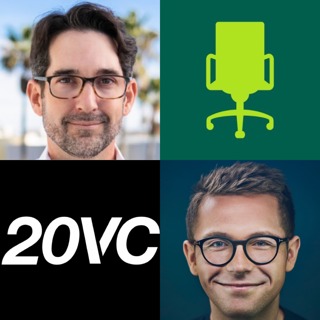
20VC: The Job of the CEO is Do As Little As Possible; How To Hire, What Questions To Ask, Why Pointy People are Always 100xers, How To Tell Great Stories Today & How Leaders Must Determine What To Delegate vs What To Control with Ian Siegel, Co-Founder an
Ian Siegel is the Founder and CEO @ ZipRecruiter, a leading online employment marketplace that uses AI-driven matching technology to actively connect millions of businesses and job seekers to their next great opportunity. Since co-founding the company in 2010, more than 1.8M employers have used ZipRecruiter to find their next great hire and over 500 million job applications have been submitted through the site. Prior to their IPO last year, Ian bootstrapped the company for many years to many millions in revenue before taking venture funding from IVP, Wellington Management and Basepoint Ventures to name a few. Before founding ZipRecruiter, Ian served in key leadership roles at CitySearch, Stamps.com, and Rent.com (an eBay company). In Today's Episode with Ian Siegel You Will Learn: 1.) The Founding of Olo: How did Ian co-found ZipRecruiter from his kitchen with no venture funding and his 3 friends? Why did they decide to not raise venture funding in the early days? What was the catalyst at $50M in revenue for realising now was the right time to raise funding? 2.) The Art of Great Storytelling What does truly great storytelling mean to Ian? What are the components of a great story? Why do so many people today f*** up their product marketing and messaging? Why does Ian believe Version 1.0 is the only one that takes true courage? 3.) CEO's Do As Little As Possible Why does Ian believe his job as CEO is to do as little as possible? How does Ian determine between the things he, the CEO should do, vs those those he should delegate? Why does Ian believe the art of leadership and the art of parenting are the same? 4.) The Art of Hiring: How has Ian's approach to hiring changed over the years? What does Ian mean when he says, "I look for pointy people"? How does he detect them? What are the two qualities that make the best execs? What questions reveal them? 5.) Parenting and Marriage: Does Ian worry that with increasing family commitments, he loses an inch on work? Why does he believe he is in an advantage as a CEO to those that do not have children? What was the biggest argument he has had with his wife? How did it change his perspective? Item's Mentioned In Today's Episode with Ian Siegel Ian's Favourite Book: Living with a SEAL: 31 Days Training with the Toughest Man on the Planet
20 Mai 202246min
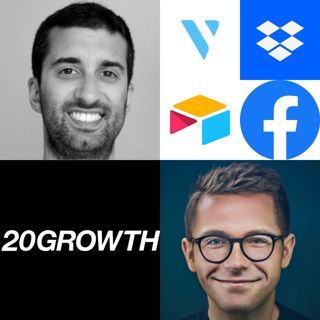
20Growth: Five Signs of Top Growth Talent and How to Detect Them, How to Structure and Conduct the Most Efficient Customer Discovery Process & The Framework to Determine Your North Star and When To Change it with Darius Contractor, Former VP Growth @ Airt
Darius Contractor is one of the pre-eminent growth leaders of the last decade. As a growth OG, he has been VP Growth @ Airtable, where he led the growth, engineering, and product teams. Before Airtable, Darius was Head of Product Growth @ Facebook Messenger and finally, before Facebook, Darius spent 4 years as Head of Growth Engineering at Dropbox; here, Darius helped drive Dropbox to $100M in net new revenue through Dropbox Business. If that was not enough, Darius is also an active angel and fund investor with a portfolio including Calm, Airtable, Clubhouse, Census and LP checks in Maven Ventures and Long Journey Ventures. In Today's Episode with Darius Contractor You Will Learn: 1.) Darius Contractor: Entry into Growth: How did Darius make his way into the world of growth? What was that first entry position? What are 1-2 of the biggest takeaways for Darius from his time at Airtable, Dropbox and Facebook? What 1-2 pieces of advice would Darius give to a growth leader starting a new role today? 2.) When is the Right Time: What does the term"growth" really mean to Darius? How do so many confuse it? When is the right time to make your first growth hire as a startup? Should this hire be a junior growth person or a growth leader? Should this initial growth team be placed inside an existing team or as a standalone team? Where do so many startups make mistakes when making this first hire? 3.) Who To Hire: How does one structure the process for your first growth hire? What are the stages? What are the qualities that we are looking to uncover in these first hires? What are the 4 interview stages to go through to test for these qualities? How should founders use case studies and practicals as a way to test for these qualities? 4.) Onboarding and Integration: What does the optimal onboarding process for new growth hires look like? What do the best growth hires do in the first 30/60/90 days? What are some early red flags that a new hire is a mis-hire? How can leaders encourage cross-functional communication between growth and the rest of the org?
18 Mai 202251min
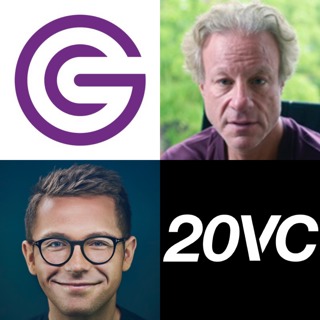
20VC: The Founding of General Catalyst, What it Takes to Build a Firm That Stands the Test of Time, Why VCs Need to Give Founders Greater Permission to Go For It & Why Venture Capital is Like Tennis with David Fialkow, Co-Founder @ General Catalyst
David Fialkow is the Co-Founder and Managing Director @ General Catalyst, one of the leading venture firms of the last decade with a portfolio including Stripe, Snap, Airbnb, Anduril, Canva and many more amazing names. Prior to founding General Catalyst with Joel Cutler, David was a serial entrepreneur building and selling 4 successful companies. In Today's Episode with David Fialkow: 1.) Everything Great Starts Small: How did David and Joel decide on a Hawaiin beach that they wanted to start General Catalyst? Why did they decide to name it General Catalyst? How did the first fundraise go for GC Fund I? 2.) Creating a Firm: The Early Days What design objectives did Joel and David have when they started the firm? How did Joel and David think about firm expansion; going to the West Coast? Coming to Europe? Going multi-stage? What drives their decision to do new products? On reflection, what were some of the toughest elements of the early days with GC? What does David believe they got right? Why? What did they get wrong? How would he change it? 3.) The Partnership: What does David believe makes for a truly successful venture partnership? How does a great venture partnership align to what makes a successful marriage? How does David approach trust? How does he build it with people? What situations would cause David to lose trust? Why do so few people understand it? What does David believe is the true secret to authentic relationship building? 4.) Doing the Impossible: Generational Transition: What does David believe they did so right in their generational transition at GC? What do many firms get wrong in handing over the reins to the next generation? What are the biggest commonalities between venture partnerships and filmmaking? Mentioned in Today's Episode with David Fialkow: David's Favourite Book: The 7 Habits Of Highly Effective People
16 Mai 202249min
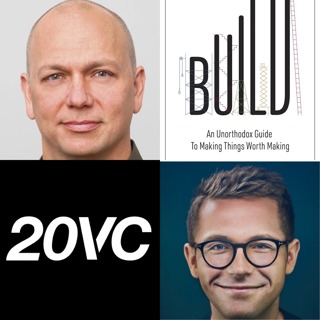
20 Product: iPhone Creator, Tony Fadell on Marketing Lessons Learned from Steve Jobs, What is Truly Great Product Marketing, How The Best Product Teams Do Post-Mortems and Product Reviews & Is Product Art or Science, Data or Gut?
Tony Fadell, often referred to as the father of the iPod is one of the leading product thinkers of the last 30 years as one of the makers of some of the most game-changing products in society from the iPhone and iPod to more recently founding Nest, creating the Nest Thermostat, leading to their $3.2BN acquisition by Google. Tony recently released Build, this is a masterclass taking 30 years of product and company building lessons and packaging them for you, check it out here. In Today's Episode with Tony Fadell: 1.) Everything Great Starts Small: How did Tony make his way into the world of product in the early days? What were his biggest takeaways from the massive flop of General Magic? How did Tony come to Apple and what were the early creation days of iPod and iPhone? 2.) Data and Brand: Does Tony believe great product building is art or science? When should teams listen to their gut vs the data? When was a time that Tony listened to his gut? When was a time Tony listened to the data? How did each situation evolve and turn out? How does Tony think about creating a truly special first mile experience? Where do so many companies go wrong in the first mile today? How does Tony balance between business decisions (COGs etc) and product decisions that will delight customers? 3.) Lessons from Steve Jobs on Product Marketing: How does Tony define great product management? Why do so many people get it wrong? What are Tony's biggest lessons from working with Steve Jobs on what makes great product marketing? Where does Tony see so many companies make the biggest mistakes when it comes to messaging? What is the difference between messaging, marketing and communications? 4.) Hiring Product Teams: What are the clearest signals of the best product talent when interviewing them? What questions does Tony always ask product people to determine quality? How do great product teams remain upbeat when launches fail and remain modest when they are wildly successful? 5.) Apple Watch, iPod and Apple HiFi: Why was the product messaging for the Apple Watch wrong in the early days? How did it change? Why was the iPod a bad business until the 3rd Generation? What changed? Why did the Apple HiFi fail? How did that impact Tony's mindset? Mentioned in Today's Episode with Tony Fadell: Tony's Favourite Book: Only the Paranoid Survive
11 Mai 202253min
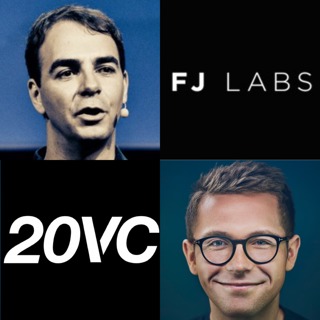
20VC: WTF Is Going On? 3 Outcomes for What Could Happen From Here; What Needs to Happen To Avoid Recession? Why Stagnation is Most Likely and What This Means for Startups and Venture & Why Catastrophe is More Likely Than Ever and Switzerland Could Be a "H
Fabrice Grinda is the Founding Partner @ FJ Labs, with over 700 investments, Fabrice has had over 250 exits and built a portfolio including Alibaba, Coupang, Airbnb, Instacart, Flexport, and Delivery Hero, and many more. Prior to FJ Labs, Fabrice served as CEO for three multinational companies; including OLX, one of the largest websites in the world with over 300 million unique visitors per month. As a result of his incredible investing success, Fabrice was named the #1 Angel Investor in the world by Forbes. In Today's Episode with Fabrice Grinda: 1.) Everything Great Starts Small: How did Fabrice make his way into the world of investing from founding 3 companies? How does Fabrice feel about founders raising funds with external LPs? Why does Fabrice feel that investing as an angel made him a better CEO? 2.) WTF is Going On: The Market Today How does Fabrice assess what is happening in the market today? What is causing the massive public market drops we are seeing? How do inflation rates and interest rates have such an impact on where we are? How much of this is a result of COVID, the shift to goods from services and supply chains? 3.) The Optimistic Case: How does Fabrice think things could get better from here? What needs to happen? What could the Fed do to enable this optimistic outcome to take place? What would need to happen in geo-politics and Russia for this to happen? What is the probability today of this optimistic case happening? 4.) The Great Stagnation: How does Fabrice think the economy could go sideways from here? What are the core drivers of this? Why is this the most likely outcome of all? What is the probability of this happening? 5.) The Catastrophe: How could this market get so much worse? What level of interest rate change would cause this outcome to occur? Why does Fabrice think that Switzerland is a "House of Cards"? What would this mean if Switzerland fell? What other European countries does Fabrice think are vulnerable? 6.) What this Means for Venture: How will LPs respond to these differing situations? How does this impact how Fabrice thinks about his rate of deployment? What segment of the market is Fabrice most excited for; early or growth? Mentioned in Today's Episode with Fabrice Grinda: Fabrice's Favourite Book: Sapiens: A Brief History of Humankind
9 Mai 202257min
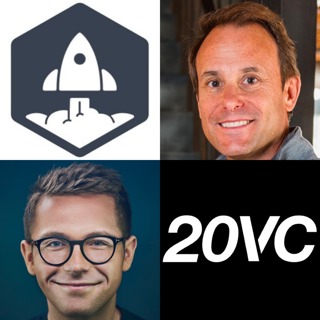
20VC: Why the Traditional Seed Fund Model No Longer Works, Why Multi-Stage Funds Investing at Seed Bring Signaling Risk but also Less Pressure, The One Criteria All Potential Sales Hires Need to Have and The Clear Signs of 10x Sales Hires with Jason Lemki
Jason Lemkin is the Founder and Managing Partner @ SaaStr, a social community of 500,000+ SaaS founders and a $100M venture fund. In the past, Jason has made investments in the likes of Algolia, Talkdesk, Pipedrive, and RevenueCat to name a few. Prior to SaaStr, Jason was the Co-Founder and CEO @ Echosign, backed by Emergence Capital, Echosign was bought by Adobe and is Adobe Sign as we know it today. In Today's Episode with Jason Lemkin You Will Learn: 1.) Origins into Venture: How Jason made his way into the world of venture having sold EchoSign? What were some of Jason's biggest lessons from his first 4 investments being unicorns? 2.) The Importance of Ownership & Multi-Stage Funds How does Jason assess the importance of ownership today? If companies can be $20BN, does ownership really matter? How does Jason advise founders who have offers from multi-stage funds at seed? Why does taking multi-stage money at seed result in less pressure for founders? Does Jason believe that signaling risk from large funds is real, when investing at seed? 3.) Building Your Sales Team Does the founder have to be the one to create the sales playbook? What are the nuances? Should you hire a Head of Sales or sales reps first? What should you expect from each? What are the one criteria that you must look for when hiring your first sales reps? What are the signals that a sales rep or leader is a 10x hire? What works when hiring sales reps, 80% of the time? 4.) Boards and VC Value Add: Why has Jason changed his mind when it comes to boards? Why are some inefficient and some very efficient? How do the best founders manage their board? How do they bring in their exec team? What is the right documentation to prepare for board meetings? Why does Jason prefer slide decks over Notion and Coda? How can leaders use board meetings to direct and goal set with functional leads? Item's Mentioned In Today's Episode with Jason Lemkin Jason's Most Recent Investment: Owner
6 Mai 202253min
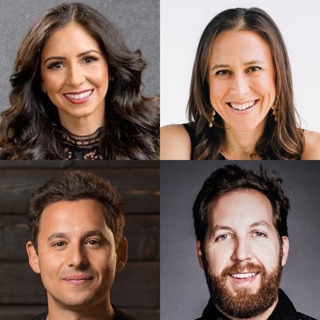
20VC: The Memo: Chris Sacca on Why We Are Breeding a Generation of Entitled Assholes, Harley Finkelstein on What Great Fatherhood Really Means, Deena Shakir on How Kids Make You a Better Investor and Anne Wojcicki on How Children Change Your Approach to R
Chris Sacca is the Founder and Chairman @ Lowercase Capital, one of the best performing funds in the history of venture capital with a portfolio including Uber, Stripe, Twitter, Instagram, Twilio, Docker and many more. Why does Chris believe we have bred a generation of asshole kids? What is the right way to negotiate with children? How has that impacted how he manages his team? Anne Wojcicki is the Founder & CEO @ 23andMe, offering DNA testing with the most comprehensive ancestry breakdown, personalized health insights, and more. How did having kids change Anne's approach to time allocation and risk? Harley Finkelstein is the President of Shopify. Over the last 12 years, Harley has partnered with Tobi to the tune of building Shopify's revenue to over $4.6BN in 2021 and the team to over 10,000 employees. Does Harley believe he has always been a good father? What changes has Harley made to be more present and there for his children? Why does Harley advise couples therapy as early in a relationship as possible? Deena Shakir is a Partner at Lux Capital, one of the leading firms investing in emerging science and technology ventures at the outermost edges of what is possible. What specific negotiation tactics from parenting can be applied to business? How can a parent show their children they listen, they understand and are there for them? Why does Deena believe children make you more productive and more efficient? Eric Liaw is a General Partner @ IVP, one of the leading later-stage venture capital and growth equity firms of the last decade with $8.7 billion of committed capital and a 40-year IRR of 43.1%. What have been the biggest challenges for Eric of managing family and work? What have been some of Eric's biggest lessons in terms of how he communicates about his work to his family? Scott Dietzen is Vice Chairman of the Board of Pure Storage and served as the Company's CEO from 2010 to 2017. Under his leadership, Pure grew to thousands of employees and completed an IPO in 2015. What can parents learn from nature programs? What core elements of parenting are directly transferrable to management?
4 Mai 202236min






















